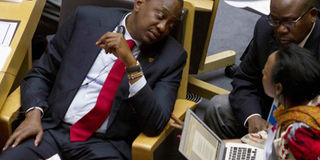Why Africa leaders failed to strike deal on ICC in Ethiopia

Kenyan President Uhuru Kenyatta (L) speaks with Cabinet secretary for Foreign Affairs Amina Mohammed (R), and Attorney General Githu Mungai (2-R) at the African Union ahead of a special summit on the continent's relationship with the International Criminal Court (ICC) on October 12, 2013. Photo/AFP
What you need to know:
- French-speaking nations are keen to fight impunity and end violent conflicts on continent
- Francophone countries and Botswana apply brakes on moves to divorce continent from world court over Kenya
A clash between French-speaking and English-speaking African countries sunk a move to withdraw Africa from the International Criminal Court in Addis Ababa at the weekend.
A combination of factors — including a division between Anglophone and Francophone countries and endless conflicts in the continent — put paid to efforts by some countries to have the African Union announce its withdrawal from the International Criminal Court.
They instead issued five demands to the ICC and its guarantor, the United Nations Security Council, to meet and pave the way for new relations with the court on crimes against humanity and high level impunity.
They also warned that should their list of demands not be met by November 12, the date set for President Kenyatta’s trial at The Hague, they will convene another Special AU Summit to make far-reaching resolutions. (VIDEO: Uhuru urged to skip ICC trial)
Sources at the AU executive council and the Heads of State meeting said that Kenya, Uganda, Rwanda, Ghana, South Africa, Zimbabwe, Sudan, Ethiopia, Nigeria, Malawi, Tanzania and Algeria pushed for the immediate declaration of the withdrawal from the Rome Statute. Algeria is a French-speaking nation and is not a member of the ICC.
Kenya’s delegation at the executive council meeting, led by Foreign Secretary Amina Mohamed and Attorney-General Githu Muigai was said to have reminded their colleagues that what ICC was doing to Kenya could be done to any African country in future.
This was the reason, they said, decisions should be taken to stop the ICC. They were aghast that the ICC had failed to respect elected African presidents and time had come for the continent to flex its muscle by renouncing its ICC membership.
It was said that they were disturbed by remarks made by the lead prosecutor in the Ruto case, Mr Anton Styneberg, that Kenya could appoint someone else to play the Deputy President’s role to allow the substantive holder of the position to be tried without interruption.
The remark, they said, bordered on lack of respect for elected African leaders.
However, Francophone countries were opposed to the proposal for mass withdrawal, saying, the AU should pursue their concerns with the UN Security Council and the State Parties forum.
Senegal, Côte d’Ivoire, the Gambia, Mali and Burkina Faso were unhappy with the slow pace at which the AU has been moving to resolve conflicts in Africa.
Joined by Botswana, they argued that while they were in agreement that the ICC should not prosecute sitting presidents, Africa — which has a long list of conflicts — should not be seen to be taking a move that will create room for such dark acts. They cited civil war in Eastern Congo, the Boko Haram conflict in Nigeria and events in Mali where the AU failed to act on time.
The Francophone countries were further opposed to the proposal that all AU members who wish to invite the ICC to investigate cases in their countries should first consult the union. This, Senegal and Côte d’Ivoire argued, would deny countries their right to solve internal problems.
It was also understood that Côte d’Ivoire and Sudan, which have cases at the ICC, wanted their position in the final statement from the Special AU Summit to be strongly reflected as was Kenya’s. Their delegations argued that while the Kenya case was urgent, their own situations also merited being included higher up in the resolutions.
Perhaps, this was the reason AU chairman Hailemariam Dessalegn, also Ethiopia’s Prime Minister, said in his opening remarks: “It should be underscored that our goal is not and should not be a crusade against the ICC, but a solemn call for the organisation to take Africa’s concerns seriously.”
The Special Summit apparently had attracted the attention of the UN and the ICC.
Sources at yesterday’s meeting said UN Secretary-General Ban Ki-moon called each of the presidents in attendance, seeking to persuade them against resolving to withdraw from the ICC.
Mr Ban promised to use his position to amend the Rome Statute charter to bring on board the concerns that were being raised by the continent.
It is understood that President Robert Mugabe of Zimbabwe, a strong supporter of severing links with The Hague, reminded the UN boss that he has “no teeth” to push for the amendments.
CONSIDERING DEFERMENT
AU Commission chairperson Nkosazana Dlamini-Zumba, in her welcoming remarks, said:
“I met ICC prosecutor Fatou Bensouda early in the week and expressed to her the concern that the UN Security Council and the ICC should work with us to enable the elected leadership of Kenya to fulfil their constitutional obligations by urgently considering deferment of the ICC proceedings against the President and Vice-President of Kenya in accordance with Article 16 of the Rome Statute.”





